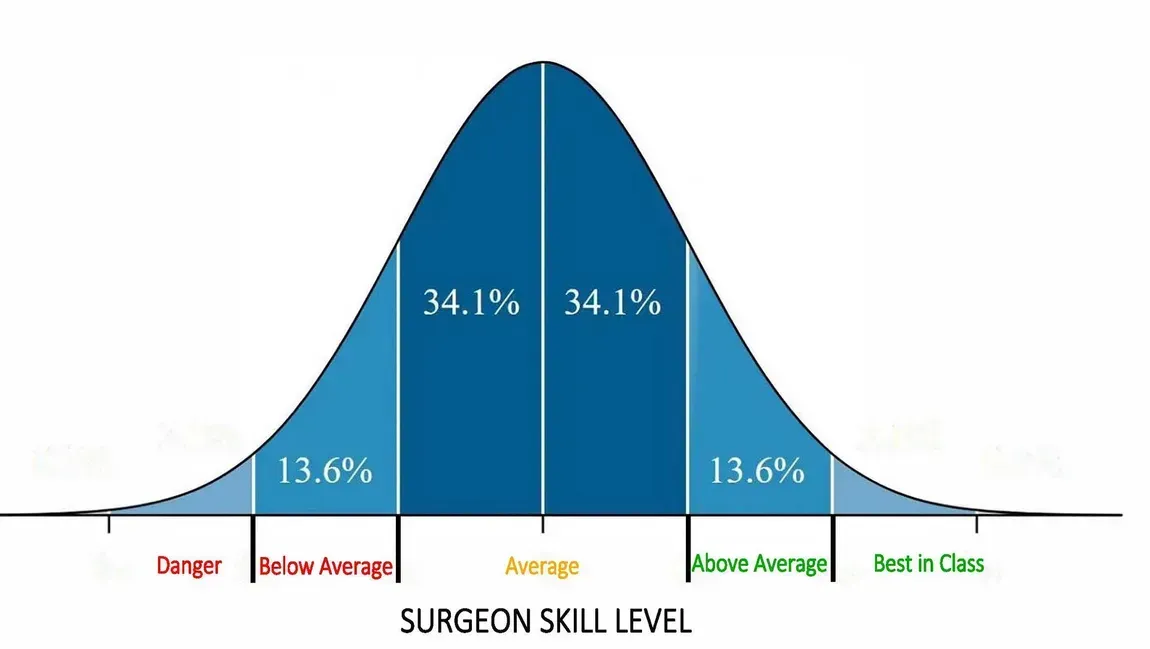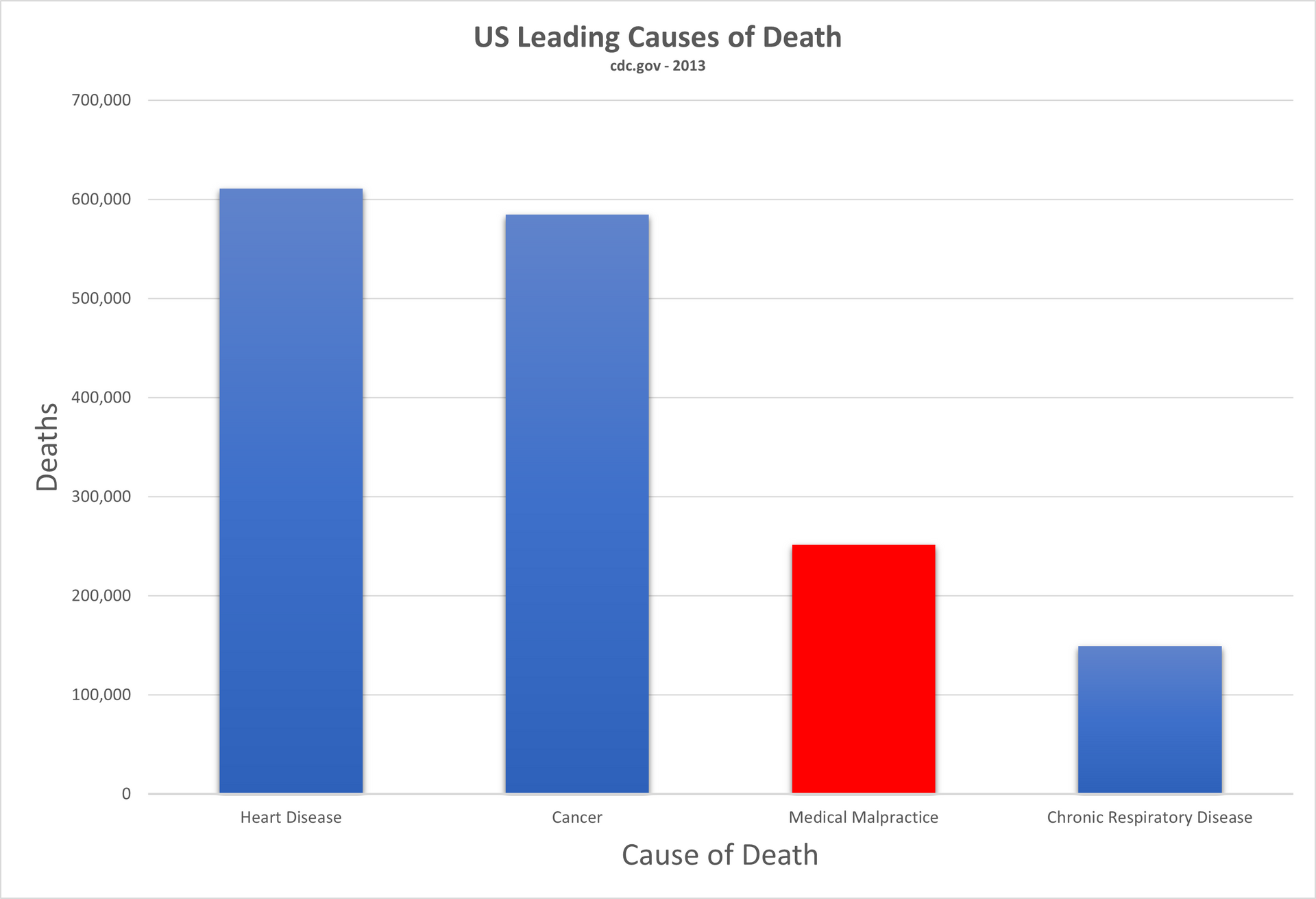How to Research a Surgeon
The Vital Importance of Researching a Surgeon
When it comes to surgery, choosing the right surgeon is a big decision. Your health, well-being, and a successful surgical outcome are dependent on the surgeon you choose to perform your surgery.
Your surgeon's skill level and experience is the best predictor of a successful surgery
To ensure you are in capable hands, conducting thorough research on potential surgeons prior to your surgery is a must.
NOT ALL SURGEONS ARE CREATED EQUAL
The bell-shaped curve is a common feature of nature. If we randomly sampled 100 surgeons, we would expect to see a normal distribution bell curve, like the one below, for many continuous variables: IQ, height, weight, blood pressure and.... surgicalskill level.


Surgeon Researcher helps you find surgeons that fall into the right tail of the standard distribution of surgeon skills. We know, from personal experience, what surgeons are BEST IN CLASS.
You want the best surgical outcomes for yourself and your loved ones. The most skilled surgeons give you the best probability of achieving the best outcome. We can help you identify these highly skilled surgeons.
Understanding the Significance of Surgeon Research
Researching a surgeon goes beyond verifying qualifications. All surgeons are technically "qualified" to perform surgery. But you don't want 'qualified', you want the best. After all, you are entrusting your life, health, and future well being to an individual who will cut you open while you are under anesthesia.
It is irresponsible to not conduct a systematic investigation into your surgeon prior to your surgery. You need to gain insights into a surgeon's expertise, success rates, experience and skill level prior to entrusting him or her with your well being.
Investigating surgeon skill is all we do at Surgeon Researcher.
Step-by-Step Guide to Effective Surgeon Research
Here is a detailed guide to help you conduct in-depth surgeon research, enabling you to confidently make the best decision for your surgical needs:
1. Define Your Surgical Requirements
Prior to researching a surgeon you need to identify your specific surgical needs and understand the procedure you require. Different surgeons specialize in various specialities (and specialities within these specialities), making it crucial to match your needs with their expertise.
For example, a surgeon may be great at total hip replacements but terrible at hip arthroscopies. We've seen it over and over. You need to be able to assess the skill level of a surgeon at the exact surgery you require.
You can start to research more about your procedure at our Surgery University.
2. Gather Recommendations and Referrals
Seek recommendations from trusted sources, such as healthcare professionals who have first-hand experiences with surgeons. Referrals can provide valuable insights and lead you to reputable options.
This is the most important step.
The only sources that know how skilled a surgeon really is are in the operating room observing surgeons on a consistent basis. You must find these 'surgical sources' and ask them for their first-hand assessment of the surgeon you are considering to perform your surgery. Or, even better, ask them which surgeon they would have perform the surgery you need on their own mother.
This step is what sets us apart from other surgeon or doctor ratings websites.
We talk to these Surgical Sources.
Our research team has over 100 combined years of operating room experience. We have an extensive network of Surgical Sources that observe surgeons perform operations across the US every day.
When our friends and family need surgery we guide them to the most skilled surgeons.
Now YOU have access to this guidance.
3. Verify Surgeon Qualifications and Credentials
Ensure the surgeon holds relevant qualifications, board certifications, and licenses. This step confirms their training, competency, and adherence to industry standards.
Surgeon Researcher performs this background check on all of our research reports.
4. Evaluate Surgeon Experience and Specializations
Delve into the surgeon's experience, particularly with procedures similar to yours. Evaluating their success rates and specialties helps ascertain their ability to perform your specific surgery.
Surgeon Researcher works with Surgical Sources - healthcare professionals who have first-hand experiences with surgeons - to obtain this information.
5. Take Online Patient Testimonials with a Grain of Salt
Other online surgeon ratings sites risk your post-surgery quality of life by providing you with compromised information.
Patients who provide these online reviews are not in a position to rate a surgeon's skill level. Patients are under anesthesia during their surgery. These online reviews are most often a review of a surgeon's bedside manner and advertising budget - not of their surgical skill level.
Websites such as HealthGrades and ZocDoc give the highest ratings to the most charismatic and business savvy surgeons - not the most skilled surgeons.These websites allow surgeons to advertise or pay for better ratings.
Surgeon Researcher does not accept any financial incentives from the surgeons we evaluate
Our business model relies on charging patients for our proprietary research. This removes all conflicts of interest so we can provide you with a truly independent assessment of a surgeon's capabilities.
Our model enables you to make an informed decision about your surgery
6. Confirm the Surgeon's Hospital Affiliations
Hospitals have varying safety records. When researching a surgeon you should also consider the hospital that the surgeon has priveledges at.
Recent studies of medical errors have estimated errors may account for as many as 251,000 deaths annually in the United States, making medical errors the third leading cause of death.
A John Hopkins study concluded that medical errors account for 10% of all US deaths.
Medical Malpractice is consistently the third leading cause of the death in the US.

Once you have found a skilled surgeon make sure they are operating with a skilled team surrounding them.
Check the surgeon's affiliations with esteemed hospitals and surgical centers. A strong association indicates a commitment to high-quality care and patient safety.
One of our favorite resources for hospital research and patient education is the American Patient Rights Association. They even have an app you can bring with you to the hospital.
Leveraging Online Resources for Surgeon Research
Harness the power of trustworthy online resources when researching your surgeon.
1. Trusted Websites and Directories
Utilize reputable websites and directories that curate lists of top-rated surgeons. These platforms provide credible information and insider info.
Surgeon Researcher is the only surgeon research or surgeon ratings site that curates surgeon intel from surgical professionals that are qualified to rate surgeons.
Other online surgeon ratings sites risk your post-surgery quality of life by providing you with compromised information.
Patients are not in a position to rate a surgeon's skill level. Why not? Patients are under anestesia during their surgery.
Other online ratings are more indicative of a surgeon's bedside manner and advertising budget than of surgical skill level. Websites such as HealthGrades and ZocDoc give the highest ratings to the most charismatic and business savvy surgeons - not the most skilled surgeons. These websites allow surgeons to advertise or pay for better ratings.
Do not rely on these websites to make a decision on your surgeon
Surgeon Researcher does not accept any financial incentives from the surgeons we evaluate.
Our business model relies on charging patients for our proprietary research. By removing any conflicts of interest, we can provide you with a truly independent assessment of a surgeon's capabilities. This enables you to make an informed decision about your healthcare.
2. Professional Organizations and Certifications
When researching a surgeon you should explore the surgeon's affiliations with esteemed professional organizations and certifications, signifying their commitment to ongoing education and skill development.
Surgeon Researcher performs this step in all of our research.
3. Check State Medical Boards and Licensing Authorities
Consult state medical boards and licensing authorities to ensure the surgeon's credentials are up-to-date and free of any disciplinary actions.
Surgeon Researcher performs this step in all of our research.
Key Questions to Pose During Consultations
Prepare questions for your prospective surgeon during pre-op consultations:
1. Surgical Experience, Success Rates, and Complication Rates
The most important question you can ask your surgeon is "how many times have you performed this surgery in the past week, month, and year".
Studies consistently show that the best predictor of a successful surgery is the case volume of the surgeon performing the surgery.
Practice makes perfect.
Surgeon Researcher obtains this information from our Surgical Sources, not the surgeon, to remove any potential conflict of interest.
2. Surgical Techniques and Innovations
Prior to your pre-op consultation do your research on different techniques and technologies that can be used to perfor your surgery.
Ask your surgeon about the latest surgical techniques and innovations you researched and find out how, or if, the surgeon employs to optimize your surgical outcome.
You want a surgeon that is up to date on the latest surgical techniques and technologies but is not experimenting with them on patients. If your prospective surgeon says he is using a new technology, ask how many cases they have performed using that technology. As a rule of thumb, you don't want to be one of the first 10 patients.
Surgeon Researcher discusses surgical technologies, techniques, and innovations with our Surgical Sources that are in the Operating Room with your prospective surgeon. Our Surgical Sources let us know not only what technologies your prospective surgeon uses, but how proficient they are with that technology.
3. Post-Operative Recovery and Aftercare
Understand the surgeon's approach to post-operative recovery and aftercare for a smooth healing process.
Patient advocates may be able to help you with this step. One of our favorites is Umbra Health Advocacy.
4. Surgeon's Communication Style and Bedside Manner
Evaluate the surgeon's communication style and bedside manner to ensure a comfortable patient experience. You should be comfortable asking your surgeon tough questions.
Finalizing Your Surgeon Selection
Tips for Making a Confident Decision
Trust your instincts and rely on the information gathered throughout the research process.
Listen to Your Instincts and Trust Your Research
By diligently following these steps, you can confidently choose a skilled surgeon who will provide exceptional care during your surgical journey.
Surgeon Researcher is here to provide you with insider intel on surgeons in your area. We will find out who our Surgical Sources send their own family members to when they require surgery.
After working with Surgeon Researcher, you will be confident going into surgery that you are being operated on by a skilled surgeon.
Surgeon Researcher - Final Words
Your health is your most valuable asset, and investing time in surgeon research is a critical step towards achieving the best possible outcome for your procedure. With thorough research, expert guidance, and an unwavering commitment to your well-being, you can confidently embark on your path to a successful surgical experience.
Remember, at the heart of every successful surgical journey is the foundation of well-informed decision-making.
The best predictor of successful surgery is the skill level of your surgeon.
Surgeons are NOT created equal.
Studies, and our experience, show that patients who are operated on by the most skilled surgeons have lower rates of revision surgery, complications, infection, pain, opioid use, and death. The most skilled surgeons achieve the best surgical outcomes - providing you with the quickest recovery and best quality of life.
Finding the most skilled surgeon can be an impossible task if you do not work in the medical industry.
Surgeon Researcher is here to change that.
The only sources that know how skilled a surgeon really is are in the operating room with surgeons on a consistent basis.
We talk to these sources.
We are the only surgeon research organization dedicated to finding patients like you the most qualified surgeons in the country by going straight to the best sources.
Our goal is to equip you with all the information you need to make an informed choice about your health care.
Here at Surgeon Researcher, we prioritize the needs of our clients. We are advocates for the patients, not surgeons.
Don't risk your future quality of life. Get in touch with Surgeon Researcher so we can ensure a qualified surgeon is performing your surgery.
You can rely on us to be your advocate in the fight for better surgical outcomes.
Do you want to make sure you are seeing a skilled surgeon?
We're here to assist you in making an informed decision about your surgeon selection
Thank you for contacting us.
We will get back to you shortly.
Please try again later

